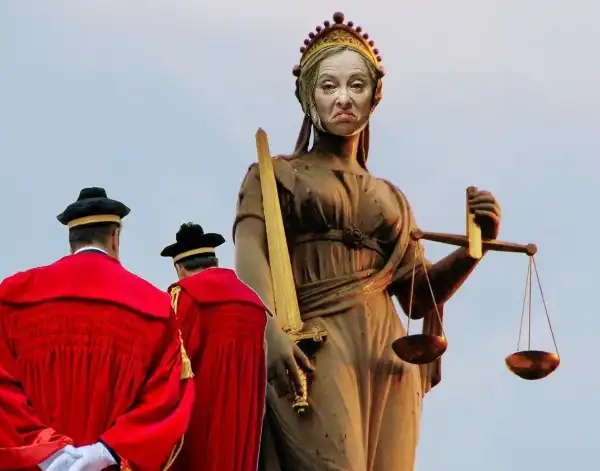
DAGOREPORT - ARIANNA MELONI E I CAPOCCIONI DI FRATELLI D’ITALIA POSSONO RIPETERE A PAPPAGALLO CHE…


Serena Danna per “corriere.it”
E alla fine Bob Dylan parlò. Dopo mesi di illazioni, giudizi, scontri sul conferimento del premio Nobel per la letteratura al cantautore americano, Dylan si riappropria del palcoscenico dell’Accademia svedese. Doveva essere il grande assente della cerimonia di premiazione, rappresentato dall’amica di sempre Patti Smith che, emozionatissima, ha cantato A Hard Rain’s A-Gonna Fall.
E invece, dopo le lacrime e le medaglie, Dylan ricompare attraverso un testo — letto durante il banchetto dall’ambasciatrice americana in Svezia Azita Raji — in cui finalmente restituisce la sua versione, a partire dai ringraziamenti: «Essere premiato con il Nobel per la letteratura è una cosa che non avrei mai immagino nella mia vita», scrive.
Anche perché, fin da piccolo, si è confrontato con i «giganti della letteratura» — cita Rudyard Kipling, George Bernard Shaw, Thomas Mann, Pearl Buck, Albert Camus ed Ernest Hemingway —, dunque essere tra loro «è qualcosa che va davvero oltre le parole».
È un discorso pieno di empatia verso i maestri: «Io non so se questi uomini e donne abbiano davvero mai pensato di poter essere onorati con il Nobel un giorno, tuttavia credo che chiunque scriva un libro, una poesia o un’opera teatrale, ovunque nel mondo, custodisca dentro di sé quel segreto, probabilmente così sotterrato da non sapere neanche se c’è davvero». Dylan — classe 1941 — dichiara di aver paragonata l’eventualità di vittoria del Nobel a quelle di andare sulla Luna: «Nell’anno in cui sono nato e in quelli successivi non c’era praticamente nessuno nel mondo considerato bravo abbastanza da vincere un Nobel. Così riconosco di essere davvero in una compagnia scarna».
Il paragone con gli astronauti non è l’unico del discorso di Dylan e, probabilmente, neanche il più visionario, visto che per spiegare la sua reazione al premio (e quello che rappresenta) ricorre a William Shakespeare. Tutto è cominciato il giorno dell’annuncio: dopo la notizia — «ci ho messo qualche minuto per realizzare quello che era successo» — l’artista ha iniziato a pensare al grande autore inglese: «Suppongo che lui si considerasse un drammaturgo. Probabilmente il pensiero che con il suo lavoro stesse producendo letteratura non l’ha neanche mai sfiorato.
Le sue parole erano scritte per il palcoscenico. Per essere recitate, non lette. Mentre scriveva l’Amleto sono sicuro che pensava a tantissime cose diverse.“Chi è l’attore giusto per questo ruolo?”, “Come andrò in scena?” “Voglio davvero ambientarlo in Danimarca?”». Non solo. Di sicuro — ipotizza Dylan — c’erano anche questioni molto meno nobili: «Ci sono abbastanza posti a sedere per i miei finanziatori? Come posso recuperare un teschio umano?». In definitiva, scommette il cantautore, «la cosa più lontana dalle mente di Shakespeare era domandarsi se stesse facendo letteratura».
Lo sa perché, in fondo, si rispecchia in lui: «Come Shakespeare, anche io sono spesso occupato nel perseguimento delle mie imprese creative e alle prese con gli aspetti pratici: “Quali sono i musicisti migliori per questa canzone?”,“Sto registrando nello studio giusto?”, “La tonalità è corretta? Queste cose non cambiano mai, neanche in 400 anni. Mai ho avuto il tempo di chiedermi “le mie canzoni sono letteratura?”». Il cantautore — che ringrazia l’Accademia per aver preso in considerazione seriamente quella domanda e «fornito una meravigliosa risposta» — ricorda le sue aspirazioni da adolescente:
«Pensavo che magari un giorno le mie canzoni sarebbero passate nei caffè o nei bar, e più avanti magari in luoghi come il Carnegie Hall o il London Palladium». E continua: «Se poi mi fossi messo a sognare in grande, allora forse avrei immaginato di registrarle e quindi di ascoltarle alla radio. Quello era il grande premio nella mia testa». Al di là dei sogni, quello che resta cruciale nel Dylan-pensiero sono le canzoni, «il centro vitale di ogni cosa che faccio: sembrano aver trovato un posto nella vita di molte persone attraverso differenti culture e ne sono grato».
Dylan chiude con una confessione: «Come performer, ho suonato per 50 mila persone e per 50 e posso dirvi che è più difficile suonare per 50. 50 mila persone formano un’entità unica, ma non 50. Ogni persona ha un’identità separata, individuale, un mondo dentro di sé. Possono percepire le cose più chiaramente: la tua onestà e come si relazione alla profondità del tuo talento. Il fatto che il Comitato del Nobel sia così piccolo mi fa un certo effetto».
Dal canto suo, il Comitato ha ribadito, attraverso l’accademico Horace Engdahl, la convinzione nella scelta di Dylan, spazzando via qualsiasi dubbio: «Aver riconosciuto la rivoluzione attribuendo a Dylan il Nobel — ha detto Engdahl — sembrava al momento audace: ora sembra già ovvio». Perché, quando lui è arrivato «all’improvviso tutta la poesia del mondo è sembrata anemica, mentre le parole delle canzoni che i suoi colleghi continuavano a scrivere sembravano come la vecchia polvere da sparo dopo l’invenzione della dinamite».
A parte il presidente colombiano Manuel Santos, Nobel per la Pace, che ha definito l’onoreficenza «un regalo caduto dal cielo» , restano sullo sfondo gli altri premiati: il biologo Yoshinori Ohsumi; i fisici David Thouless, Duncan Haldane e Michael Kosterlitz; i chimici Jean-Pierre Sauvage, Sir J. Fraser Stoddart e Bernard L. Feringa; gli economisti Oliver Hart e Bengt Holmström. Orgogliosi e discreti nei loro tight scuri con camicia bianca, come richiesto dal dress code, rigidissimo, hanno pronunciato la «Nobel Lecture», il discorso di accettazione, e sono tornati al posto con la medaglia. Ieri sera la scena era tutta per il menestrello assente.
TESTO DI BOB DYLAN ALL’ACCADEMIA
Good evening, everyone. I extend my warmest greetings to the members of the Swedish Academy and to all of the other distinguished guests in attendance tonight.
I'm sorry I can't be with you in person, but please know that I am most definitely with you in spirit and honored to be receiving such a prestigious prize. Being awarded the Nobel Prize for Literature is something I never could have imagined or seen coming. From an early age, I've been familiar with and reading and absorbing the works of those who were deemed worthy of such a distinction: Kipling, Shaw, Thomas Mann, Pearl Buck, Albert Camus,Hemingway. These giants of literature whose works are taught in the schoolroom, housed in libraries around the world and spoken of in reverent tones have always made a deep impression. That I now join the names on such a list is truly beyond words.
I don't know if these men and women ever thought of the Nobel honor for themselves, but I suppose that anyone writing a book, or a poem, or a play anywhere in the world might harbor that secret dream deep down inside. It's probably buried so deep that they don't even know it's there.
If someone had ever told me that I had the slightest chance of winning the Nobel Prize, I would have to think that I'd have about the same odds as standing on the moon. In fact, during the year I was born and for a few years after, there wasn't anyone in the world who was considered good enough to win this Nobel Prize. So, I recognize that I am in very rare company, to say the least.
 PATTI SMITH CANTA BOB DYLAN ALLA CERIMONIA NOBEL
PATTI SMITH CANTA BOB DYLAN ALLA CERIMONIA NOBEL
I was out on the road when I received this surprising news, and it took me more than a few minutes to properly process it. I began to think about William Shakespeare, the great literary figure. I would reckon he thought of himself as a dramatist. The thought that he was writing literature couldn't have entered his head. His words were written for the stage. Meant to be spoken not read. When he was writing Hamlet, I'm sure he was thinking about a lot of different things: "Who're the right actors for these roles?" "How should this be staged?"
"Do I really want to set this in Denmark?" His creative vision and ambitions were no doubt at the forefront of his mind, but there were also more mundane matters to consider and deal with. "Is the financing in place?" "Are there enough good seats for my patrons?" "Where am I going to get a human skull?" I would bet that the farthest thing from Shakespeare's mind was the question "Is this literature?"
When I started writing songs as a teenager, and even as I started to achieve some renown for my abilities, my aspirations for these songs only went so far. I thought they could be heard in coffee houses or bars, maybe later in places like Carnegie Hall, the London Palladium. If I was really dreaming big, maybe I could imagine getting to make a record and then hearing my songs on the radio. That was really the big prize in my mind. Making records and hearing your songs on the radio meant that you were reaching a big audience and that you might get to keep doing what you had set out to do.
Well, I've been doing what I set out to do for a long time, now. I've made dozens of records and played thousands of concerts all around the world. But it's my songs that are at the vital center of almost everything I do. They seemed to have found a place in the lives of many people throughout many different cultures and I'm grateful for that.
But there's one thing I must say. As a performer I've played for 50,000 people and I've played for 50 people and I can tell you that it is harder to play for 50 people. 50,000 people have a singular persona, not so with 50. Each person has an individual, separate identity, a world unto themselves. They can perceive things more clearly. Your honesty and how it relates to the depth of your talent is tried. The fact that the Nobel committee is so small is not lost on me.
But, like Shakespeare, I too am often occupied with the pursuit of my creative endeavors and dealing with all aspects of life's mundane matters. "Who are the best musicians for these songs?" "Am I recording in the right studio?" "Is this song in the right key?" Some things never change, even in 400 years.
Not once have I ever had the time to ask myself, "Are my songs literature?"
So, I do thank the Swedish Academy, both for taking the time to consider that very question, and, ultimately, for providing such a wonderful answer.
My best wishes to you all,
Bob Dylan

DAGOREPORT - ARIANNA MELONI E I CAPOCCIONI DI FRATELLI D’ITALIA POSSONO RIPETERE A PAPPAGALLO CHE…

DAGOREPORT – CHE FINE FARA' MATTEO SALVINI? QUANTE CHANCE HA IL SEGRETARIO DELLA LEGA DI…

DAGOREPORT - UNO DEI MISTERI PIÙ INDECIFRABILI DELLE CRONACHE POLITICHE DEGLI ULTIMI GIORNI HA UN…

DAGOREPORT - FANNO BENISSIMO QUEI SINISTRELLI DI BONELLI E FRATOIANNI A CHIEDERE CONTO A SALVINI…

DAGOREPORT – BENVENUTI AL FESTIVAL DI ATREJU! “CI SIAMO PRESI FINALMENTE SANREMO”, GHIGNANO…

DAGOREPORT - COME MAI LA TRATTATIVA TRA JOHN ELKANN E IL MAGNATE GRECO THEO KYRIAKOU PER LA VENDITA…